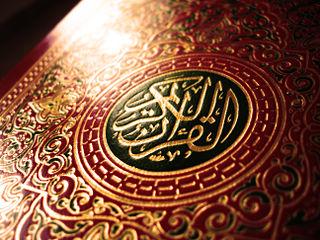First LGBT-friendly mosque opens in France
The front of a Quran — the Islamic book of text. Some believe that the implications of Islam on homosexuality aren’t from the Quran, but from interpretations of Islam. (Photo courtesy of Crystalina via Wikimedia Commons.)
The first gay-friendly mosque opened last week in a Paris suburb.
Located within a small room inside a Buddhist monk’s home, it’s the first mosque that reflects a progressive Islamic revolution underway across Europe.
Ludovic-Mohamed Zahed, the founder of the mosque and a gay-rights activist, says creating an inclusive mosque open to Muslims and non-Muslims, including those who part of the LGBT community, is reflective of an alternative form Islam in France.
“Islam is a philosophy of life, a spiritual quest. It has nothing to do with controlling sexuality,” he said.
What controls sexuality and identity, he says, is politics. He believes it’s time to recognize the difference, but in a cautious and respectful manner.
Other Muslims argue the Quran doesn’t recognize a separation between politics and philosophy of life. But Zahed says that’s their point of view and democracy is about expressing those views.
“The majority of people in France would not believe that religion has to rule our everyday life. (Religion) is just something that will enhance our representation of ethics,” he said.
In an interview with Reuters, Dalil Boubakeur, Imam of The Great Mosque of Paris, says Zahed’s mosque is outside of the Muslim community and therefore Zahed will no longer be part of the community.
“(Zahed’s) mosque will not be one that others will visit or come to pray at because it is built on foundations which are condemned by religion,” he said.
Those foundations, Zahed argues, don’t come from the Quran but rather centuries of manipulation.
“You will never see homosexuality — that term — used in the Quran. You will never see a verse of the Quran forbidding women to be imams. Just the opposite,” he said.
In the United States, similar efforts have been underway. Ani Zonneveld, co-founder and president of Muslims for Progressive Values, says the idea of inclusive mosques and prayer spaces has caught on globally. In the United States, the first inclusive mosque was established more than six years ago.
“We are aware that what we are offering is an alternative. But the alternative that we’re offering is not an alien concept,” she said.
When Muslims embark on the hajj pilgrimage to Mecca, Zonneveld says, there is no segregation during prayer — segregation comes from elsewhere.
“We have always had female imams in our heritage, but what happened was politics, what happened was power, what happened was misogyny took over Islam,” she said.
Zonneveld says the implications of Islam on homosexuality are all based on interpretations of Islam — not on words written in the Quran.
Zonneveld’s efforts haven’t gone unnoticed. She said she receives emails from ex-Muslims all over the world, including in the Middle East, who share similar ideas regarding women leading prayer.
“As far as they’re concerned, they’ve had their Arab Spring, now the next step is an Islamic Revolution,” she said.
Over a 10-year span, Zahed says he has seen a difference when making the pilgrimage to Mecca. Women are ostracized and put behind barriers that didn’t exist ten years ago.
He says he’s seen both positive and negative things happen in Islam, but believes it’s only the beginning of a reformation of Islam.
